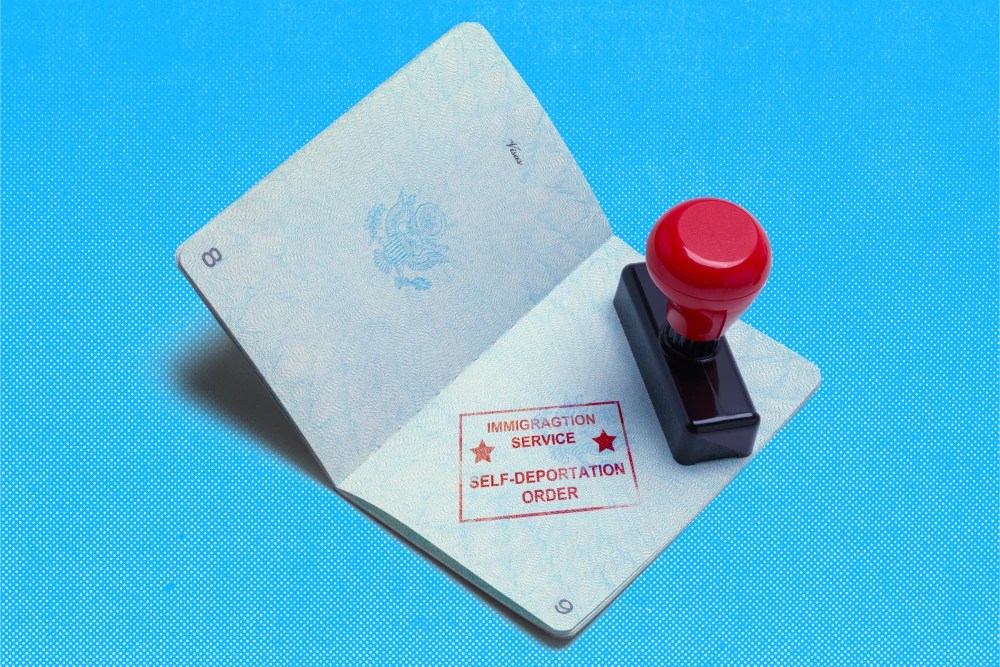Deportation as a US Citizen? 7 Rights You MUST Know!
Facing Deportation? A US Citizen's Guide to Staying Put
Introduction: When the Government Says "Leave Now!"
Imagine this: You're a U.S. citizen, going about your life, when BAM! You receive a jarring email from immigration authorities telling you to leave the country. It sounds like something out of a dystopian movie, right? But what if it happens? While the direct scenario described in the alarming mass email from the Department of Homeland Security (DHS) was primarily aimed at those with Temporary Protected Status (TPS), it raises a critical question: What rights do U.S. citizens have if faced with deportation threats? Let's dive into this complex issue and explore your options.
Understanding the DHS Warning: Who Was it For?
The email, titled “Notice of Termination of Parole,” explicitly stated, “If you do not depart the United States immediately you will be subject to potential law enforcement actions that will result in your removal from the United States…” This wasn't just a polite suggestion; it was a stark warning. It targeted individuals, often those with TPS from countries experiencing unrest, whose protected status was being revoked. But what if you’re a citizen? Can this threat somehow impact you? Understanding the nuances of immigration law is key.
Citizen vs. Non-Citizen: The Crucial Distinction
This is the million-dollar question! As a U.S. citizen, you possess inherent rights and protections under the Constitution that non-citizens do not. Deportation proceedings are typically reserved for non-citizens who have violated immigration laws or committed certain crimes. However, the complexities can arise if your citizenship is questioned, or if you are mistakenly identified as a non-citizen.
Scenario 1: Challenging Your Citizenship?
Occasionally, the government may question someone's citizenship. This is rare, but it can happen. Perhaps your birth certificate is missing, or there are inconsistencies in your naturalization paperwork. Here's what to do:
Collecting Proof of Citizenship
The burden of proof generally falls on you to demonstrate your citizenship. Gather all relevant documentation, including:
- Birth certificate (if born in the U.S.)
- Naturalization certificate (if naturalized)
- U.S. passport
- Consular Report of Birth Abroad (if born abroad to U.S. citizen parents)
- Any other documents that support your claim of citizenship (e.g., old ID cards, school records).
Consulting an Immigration Attorney
This is non-negotiable. An experienced immigration attorney can assess your situation, advise you on the best course of action, and represent you in any legal proceedings. Don’t try to navigate this alone.
Scenario 2: Mistaken Identity: "But I'm a Citizen!"
Imagine being incorrectly flagged as a non-citizen. It's a bureaucratic nightmare, but it happens. Maybe there's a similar name or a clerical error. What then?
Immediate Action: Demand Clarification
If you are approached by immigration authorities and believe you've been mistakenly identified, immediately and politely assert your citizenship. Show them your identification documents (passport, driver's license, etc.).
Document Everything
Keep detailed records of every interaction with immigration officials: names, dates, times, locations, and what was said. This documentation will be invaluable if you need to pursue legal action.
File a Complaint
If the situation escalates despite your proof of citizenship, consider filing a formal complaint with the Department of Homeland Security's Office for Civil Rights and Civil Liberties (CRCL). This can help rectify the error and prevent it from happening again.
The Importance of Legal Representation: Your Shield
We've mentioned it before, but it bears repeating: an immigration attorney is your best defense. They can:
- Explain your rights
- Navigate complex immigration laws
- Represent you in court
- Negotiate with immigration officials
- Ensure your due process rights are protected
Understanding Due Process: Your Constitutional Right
As a U.S. citizen, you have the right to due process under the Fifth and Fourteenth Amendments. This means the government cannot deprive you of life, liberty, or property (including your right to remain in the U.S.) without due process of law. This includes the right to notice, a fair hearing, and the opportunity to present your case.
What to Do if Detained: Know Your Rights
Even if you are a citizen, you might find yourself detained by immigration authorities due to a mistake or misunderstanding. Here’s what you need to know:
Remain Calm and Assert Your Rights
It’s easier said than done, but staying calm is crucial. Clearly and repeatedly state that you are a U.S. citizen.
The Right to Remain Silent
You have the right to remain silent. Exercise this right. Do not answer any questions beyond providing your name and requesting an attorney. Anything you say can be used against you.
Demand an Attorney
Immediately request to speak with an attorney. Do not sign any documents or make any statements without legal representation.
Fighting Back: Legal Avenues for Citizens
If your citizenship is being challenged or you are facing wrongful deportation proceedings, you have several legal options:
Habeas Corpus: Challenging Unlawful Detention
A writ of habeas corpus is a legal action that challenges the legality of your detention. It requires the government to justify why you are being held.
Declaratory Judgment: Establishing Citizenship
You can file a lawsuit seeking a declaratory judgment from a federal court affirming your U.S. citizenship. This provides a legally binding declaration of your status.
Injunctive Relief: Stopping Deportation
If deportation is imminent, you can seek an injunction from a federal court to stop the removal proceedings. This requires demonstrating that you are likely to succeed in proving your citizenship.
The Emotional Toll: Taking Care of Yourself
Being threatened with deportation, even as a citizen, is incredibly stressful and emotionally draining. Don't underestimate the impact on your mental health.
Seeking Support
Talk to friends, family, or a therapist. Sharing your feelings and experiences can help you cope with the stress.
Self-Care
Prioritize self-care activities: exercise, healthy eating, relaxation techniques. Taking care of your physical and mental well-being is essential.
Preventative Measures: Safeguarding Your Citizenship
While you can't predict every situation, there are steps you can take to protect your citizenship:
Maintain Your Documents
Keep your citizenship documents (birth certificate, passport, naturalization certificate) in a safe and easily accessible place. Consider making copies and storing them separately.
Stay Informed
Keep up-to-date on immigration laws and policies. Knowledge is power.
Beyond the Individual: Systemic Issues and Advocacy
While focusing on individual actions is important, remember that these situations often highlight larger systemic issues within the immigration system. Consider supporting organizations that advocate for immigrant rights and reform.
Conclusion: Stay Vigilant, Know Your Rights, Seek Help
While the scenario of a U.S. citizen being told to leave the country might seem absurd, it's crucial to be prepared. If you find yourself in this situation, remember these key takeaways: assert your citizenship, gather proof, seek legal counsel immediately, and understand your due process rights. Stay vigilant, stay informed, and don't be afraid to fight for your right to remain in the United States.
Frequently Asked Questions (FAQs)
Here are some frequently asked questions to further clarify the situation:
- What if I don't have my birth certificate?
If you don't have your birth certificate, you can request a certified copy from the vital records office in the state where you were born. If that's not possible, other documents like baptismal records, early school records, or affidavits from people who knew you at birth can be used as secondary evidence.
- Can I be deported if I commit a crime?
As a U.S. citizen, you cannot be deported for committing a crime. However, you can be prosecuted in the criminal justice system and face imprisonment or other penalties. Certain crimes committed after naturalization could, in extremely rare cases, lead to denaturalization proceedings, but this is very uncommon.
- What's the first thing I should do if ICE agents approach me?
The first thing you should do is remain calm and politely ask if you are free to leave. If they say no, then clearly state that you are a U.S. citizen. Request to see a warrant, and if they have one, examine it carefully. Do not answer any questions beyond providing your name. Request to speak with an attorney immediately.
- How can I find a qualified immigration attorney?
You can find a qualified immigration attorney through referrals from friends, family, or other attorneys. You can also use the American Immigration Lawyers Association (AILA) website to search for attorneys in your area. Look for attorneys with experience in citizenship and deportation defense.
- What if I can't afford an attorney?
If you can't afford an attorney, you may be eligible for free or low-cost legal services from non-profit organizations. Contact your local legal aid society or search online for "free immigration legal services" in your area. Some bar associations also offer pro bono (free) legal services.


